by John Seymour, a long-time resident of Arlington, Virginia
Public libraries fill a critical role in our democracy. They promote literacy and ensure access to books open to a wide range of perspectives and opinions, including some that are not sanctioned by prevailing social and political groupings or religions. Libraries are, in the words of Diane Kresh, the Director of Arlington’s library system, “judgment-free zones, safe places that welcome all who enter their doors, regardless of belief, preferences, country of origin, age, income status, or experiences.” Libraries also must be resilient and accommodating, able to meet difficult challenges like reversing the decades-long decline in reading or managing a complex and expensive transition from paper to digital media.
Nothing, however, has prepared the nation’s libraries for their most pressing threat of the past few years — a flood of book-banning attempts brought by conservative parent groups and politicians.
The American Library Association’s Office for Intellectual Freedom tracked nearly 700 attempts to ban books during the first 8 months of 2022 alone, the largest number of attempted book bans since it began tracking challenges 20 years ago. PEN America, a non-profit devoted to free expression, also documented hundreds of book banning attempts in the past year. Although some of the targeted books deal with themes of sex and gender identity, a growing number address issues of race, with critics claiming that the books indoctrinate readers with “divisive concepts.” PEN American’s investigation of book banning efforts found that they are not, despite the characterization by conservative media, the result of spontaneous expressions of parental concern. Rather, they are the products of organized groups and political movements that flourished during the COVID pandemic, and who staunchly oppose a range of “progressive initiatives” such as Black Lives Matter, efforts to address climate change, mask mandates, and virtual schooling.
Virginia has become a major front in the censorship battles. Governor Youngkin’s successful campaign for governor relied, in no small part, on claims that parents, not teachers or librarians, should control what students read. His first Executive Order, signed the day of his inauguration, sought to end the teaching of what he termed “inherently divisive concepts,” including any suggestion to view life filtered “through the lens of race.” The Executive Order rescinded a memorandum issued by the Virginia Department of Education under former Democratic Governor Northam identifying resources designed to encourage racial sensitivity in public institutions. Those resources include some of the books most frequently challenged by cultural vigilante groups nationwide. At the same time, Governor Youngkin established a tip line — widely ridiculed and now discontinued — urging parents to report any “inherently divisive practice” of which they became aware.
A second initiative, with even greater potential implications for the erosion of free expression in the Commonwealth, is underway at the Virginia Board of Education. The Board, now dominated by Youngkin appointees, is charged with developing Standards of Learning for History and Social Science. Many are concerned that the draft standards, essentially guidelines for public school curricula, will repeat and reaffirm the errors of judgment and intentional misstatements of the former Virginia History and Government Textbook Commission, which drafted the texts used in Virginia public schools for decades.
The history of American slavery and race relations contained in those volumes, now preserved in Arlington Library’s Center for Local History, serve as object lessons in false narratives, faithful to the Lost Cause mythology of kind masters and happy slaves, and of African-Americans grateful for their protection from “the spear and war clubs of enemy tribes” and for the “comforts of a civilized life” in America. Already, critics of the proposed new standards are expressing deep concerns that the drafters have deleted discussions of the persistent and corrosive effects of racism while accentuating conservative themes praising the free market and limited government and “the optimism, ideals and imagery captured by Ronald Reagan’s ‘shining city upon a hill’ speech.”
Arlington’s libraries have long been a champion of access, particularly for traditionally marginalized groups which historically have been unrepresented by publishers. As part of its mission to promote both a critical and informed citizenry and the joy of reading, the Arlington Library has, since 2006, sponsored “Arlington Reads,” a series of talks by acclaimed authors, journalists, and poets. Unsurprisingly, given Arlington’s deep-blue politics and the Library’s long-standing commitment to equity, many of the invited authors might fairly be classified as progressives. Their books address such important social issues as the threat of climate change, the surge in evictions amidst a national housing crisis, and the persistence of poverty and racial discrimination. Some of the speakers are people of color and the Library is proud that many of the authors have written books targeted for banning. Authors are paid for their presentations, with their fees varying depending on their celebrity, scholarship, and other factors. The program is funded by Friends of the Arlington Library, a voluntary citizens’ group established to support local libraries for the betterment of the County as a whole.
Despite its pronounced progressivism, the Arlington Reads program has been — until very recently — entirely uncontroversial. Although the reasons for the relative quiescence might require a detour into generally taboo issues of taste and social class, it may be that the long-standing anti-intellectual stance of right-wing politicians and cultural conservatives may be a factor. The essayist Joan Didion commented, years ago, on the then-new Governor’s Mansion in Sacramento— designed by Ronald and Nancy Reagan — the premier icons of the contemporary right-wing — as a home largely “evocative of the unspeakable” with a hot tub and wine cellar, but without bookcases. More recently, former Republican vice-presidential candidate Sarah Palin admitted that she doesn’t read books. And former President Donald Trump routinely expresses, with a pride entirely deaf to irony, his “love for the poorly uneducated.” Level of education is highly correlated with increased library use and the author program might be seen, by some, as a gathering of those with whom they have little in common.
Whatever the reasons for its past obscurity, the author program is hidden no longer. In September, as part of the Arlington Library’s Banned Book Week program, the Friends of the Arlington Library invited Nikole Hannah-Jones, creator of The 1619 Project: A New Origins Story, to give a talk at an Arlington high school. Ms. Hannah-Jones is a professor at Howard University, a Pulitzer Prize-winning journalist for the New York Times, and the recipient of numerous honors for her writing on race and social justice, including a MacArthur “genius” award. The 1619 Project is probably the most widely-read and hotly debated piece of American history published within the last few decades. It includes essays exploring the legacy of slavery in our nation’s cultural, political, and legal institutions and the way it continues to shape contemporary life.
The book quickly became a boogeyman for the alt-right, however, and the impetus for countless attacks on Ms. Hannah-Jones in the conservative media. The book has even been targeted specifically by Republican legislators nation-wide as one that should be banned from libraries entirely. They find the book offensive because it challenges some of the linchpins of the traditional American story — an unwavering belief in American exceptionalism, a reverence for an unfettered free market, and a comforting confidence in a slow though steady racial reconciliation. Most important, conservative politicians understand that, if the book’s truths are acknowledged, they may have to do something about them. They’ll need to reconsider long-held positions on voting rights restrictions, criminal justice reform, the fairness of affirmative action, expansion of health care, and zoning changes to help redress some of the worst effects of neighborhood red-lining and racial covenants, among other issues that are anathema to their voters. It is far safer for politicians to ignore or deny those truths — and better yet, ban them — than risk losing their seats.
Consistent with past practice, the Friends of the Arlington Library paid Ms. Hannah-Jones an appearance fee. That fee, however, was $40,000, well above the fee typically charged by guest authors and one that caused some eyebrow-raising among the organization’s officers. Immediately following her talk, right-wing media outlets attacked the Library for its purported extravagant expenditures of taxpayer monies to host a controversial academic. When it became known that no taxpayer monies were involved, they instead railed against Hannah-Jones’s temerity, as a well-compensated African-American professor and prominent journalist, to speak to issues of racial and economic inequalities at all. They resurrected the old canard — that the existence of a successful Black person proves that systemic racism does not exist, and that poverty is the product of individual failures of character and energy. But as The 1619 Project makes very clear, despite the integration of some blacks into a cultural and economic elite over the past half-century, the gap in wealth between black and white household incomes has barely budged in all that time.
Ms. Hannah-Jones’s critics are right about one thing, though — The 1619 Project is dangerous. It is dangerous because it is both eloquent and persuasive and explains more about how we’ve ended up like this — a nation deeply divided, strained to breaking by racial and economic inequality, and the host to white supremacists and Christian nationalists — than any of the celebratory and affirming histories of old. As such, it has the power to change minds.
And it is also true that $40,000 is a lot of money. But, although figures vary (both higher and lower), at least one source has estimated that the average cost of a slave in 1850 would be about $40,000 in today’s dollars. What purchased a lifetime of enslaved labor in 1850 now purchases an hour of uncomfortable truths, and a priceless lesson for the nation — that we can’t redeem our history through denial. We can redeem it only by telling the truth about our history which, inevitably, will compel us to act in ways that won’t require yet another redemption somewhere down the road.



![Virginia NAACP: “This latest witch hunt [by the Trump administration] against [GMU] President Washington is a blatant attempt to intimidate those who champion diversity.”](https://bluevirginia.us/wp-content/uploads/2025/07/gmuwwashington-238x178.jpg)









